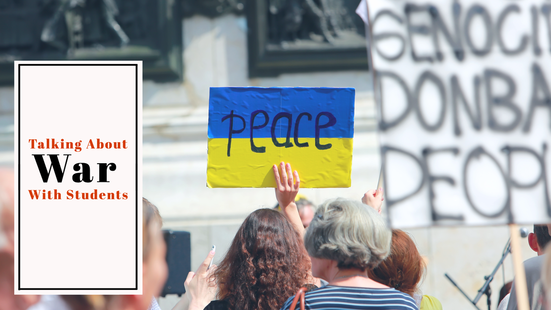|
It is such a weird time in education. Educators are under fire in the culture war that is permeating our country. Every day, you see it in the weird laws that lawmakers are coming up with that ban specific topics, require lesson plans to be turned in incredibly early, and dictate the way we talk about history, culture, and race. All while we see an unprecedented historical event in the heart of Europe with Ukraine.
I know for me, the question becomes how do we talk about this? As kids get older, the questions about the situation in Ukraine intensify and become more profound. As a teacher, can we even talk about it, though? With things like World War and Nuclear Weapons in the conversation, I think even adults have questions, so how do we parse this out to students and help them learn from the situation. How do we help them understand the conflict at a depth where they can make the right decisions if they are in charge in 10, 20, 30 years? How do we get there without setting off a political firestorm? I think the answer is to tell them the truth. To start, you have to reassure students that World War and Nuclear War are unlikely no matter what public rhetoric is said. It’s a great way to turn back to history and talk about the Cold War and how we were on the brink multiple times. In that time, leaders realized they were risking mutually assured destruction, which is likely the thought now. It’s one of the main reasons you see NATO not getting involved in a military sense. The war is also an opportunity to late out the correct events of history and let students see both sides. While it’s easy to establish a villain in the current situation in Ukraine, you also set a better understanding of history by learning and thinking through Russian intentions. If you can see their side, you can see the why, and if you can see the why our future leaders may be able to head that off at the pass in the future. It gets to the heart of what history should be. It should be a retelling of history while looking at both sides. Students should see the messy and the terrible. If we only teach the positive in history, we miss almost all of that. I also don’t think taking this approach messes with establishing patriotism in our children. You have to make history appropriate at the student's level, and young children can still start with heroes and loving the American flag. Then as they get older, you transition it into an appreciation of American survival no matter how messy extreme things got. This war in Ukraine is ugly and horrible, and it’s not something we as history teachers can stay away from, though. We just need to talk about it in the right way, and hopefully, we can use it as a proof point that educators can talk about hard things.
0 Comments
Leave a Reply. |
Archives
January 2023
Categories |

 RSS Feed
RSS Feed
